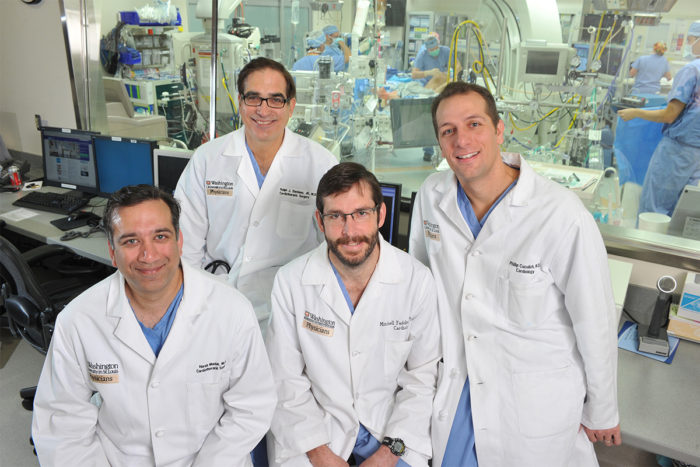Trial to evaluate procedure for patients with irregular heartbeats
Washington University doctors are participating in a study to evaluate a procedure that corrects irregular heartbeats in patients

Pioneers in surgical techniques for treating atrial fibrillation, from left: Hersh Maniar, MD, Ralph Damiano Jr., MD, Mitchell Faddis, MD, PhD and Phillip Cuculich, MD.
For almost a decade, Washington University cardiac surgeons have used the Cox-Maze IV procedure to treat atrial fibrillation, a condition where the heart beats irregularly, with about a 90 percent success rate.
Although results at Washington University and several other select centers have been excellent with reported success rates of over 90 percent freedom from atrial fibrillation at one year out, the results across the country from Cox-Maze IV surgery have been varied, says cardiothoracic surgeon Hersh Maniar, MD.
Maniar and his colleagues are involved with a study, the Ablate AF Trial, to investigate the reasons behind the variation and to standardize the procedure.
This open-heart procedure was developed by Ralph Damiano Jr., MD, chief of cardiac surgery. The method uses radiofrequency energy, that converts radio waves to heat, and cryothermy, that converts intense cold to energy. This heat and energy is used to create a defined set of ablations, or scars, and incisions in both chambers of the heart to restore a normal heartbeat.
Consistently evaluating the procedure
Fifty surgical patients who suffer from atrial fibrillation and are undergoing planned open-heart surgery for other cardiac problems will be offered the Cox-Maze IV as an accompanying procedure. These patients will be followed over a two-year period post-surgery to assess their freedom from atrial fibrillation.
Eighteen centers nationwide are participating in this physician-initiated, industry-sponsored study. During each Cox-Maze IV surgery, clinical support personnel from AtriCure will be present to record procedural data and ensure that the procedures performed are consistent from institution to institution. AtriCure makes the bipolar radiofrequency device used.
“The key focus in this trial is education and standardization among surgeons,” says Maniar. “We are very excited about seeing these results.”






